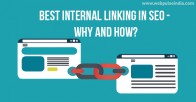The term "affiliate marketing" refers to a type of online marketing. Companies (also known as advertisers or merchants) pay people (affiliates) to promote a product or service through an affiliate link. In a nutshell, you utilise your marketing skills to push your audience to a product as an affiliate (also known as a publisher). You get a commission or kickback when someone in your audience buys a product or takes an action based on your advice.
What Are Affiliates and What Do They Do?
An affiliate might be a person or a business. According to the famous SEO Service Company in Delhi, Affiliates are typically bloggers or other content creators. They're frequently in the same or closely connected industry as the company whose items they're marketing. Affiliates are people who help promote a product or service by writing blog posts, making videos, and participating in other marketing activities. The affiliate is paid when a visitor to the affiliate company's website makes a purchase or fills out a lead form. The affiliate programme terms determine how much and for what (lead or purchase) the affiliate is paid.
Affiliates can also advertise affiliate companies on their websites by using banner ads and text links. When a lead is created, the publisher receives a commission. This is most commonly represented as a proportion of overall sales. It could also be a different amount agreed upon by the advertiser and publisher.
What are the names of the businesses?
An affiliate firm is one that is willing to pay commissions to affiliates who promote its items (also known as a merchant, advertiser, retailer, or brand). To generate more leads and sales, these businesses collaborate with affiliates.
Affiliate companies pay their affiliates for helping them achieve their objectives. The most typical payment models are pay-per-click, pay-per-lead, and pay-per-sale. Performance marketing is a term used to describe this structure.
Commission payouts usually occur on a monthly basis. However, this changes based on the affiliate program's rules. When compared to traditional pay-per-click advertising, where a large sum of money can result in few or no leads or sales, affiliate marketing is thought to be far more beneficial to businesses.
How does affiliate marketing works:
As an affiliate, you are paid based on your performance. The following are the three types of performance-based models utilised in affiliate marketing:
1- Pay–Per–Click (PPC): An affiliate is compensated for every valid click, regardless of whether they result in purchases or leads.
2- Pay–Per–Lead (PPL): Businesses pay a predetermined commission for each qualified action triggered by a click. This action could be as simple as installing an app, completing an online form, signing up for a free trial, or completing a quick survey.
3- Pay–Per–Sale (PPS): Companies pay a portion of all qualified sales as pay–per–sale. The corporation and its associates agree on this proportion. Amazon Associates is one of the most popular PPS programmes, with publishers earning up to 15% based on the things sold.
Avoiding Affiliate Marketing Mistakes and Strategies:
Although affiliate marketing can be lucrative for many people, it can also have a negative side. Affiliate marketing, like any other business that involves making money, is subject to numerous sorts of fraud, such as cookie stuffing and dropping. The best Digital Marketing Services in Delhi shares some strategies and several practises to avoid including:
1- Producing low-quality content: The days of producing keyword-rich content and dominating Google are long gone. Instead, focus on producing high-quality material that adds value to each post.
2- Using a "hard sell" strategy: Instead of using a direct sales strategy, focus on creating relationships. Customers who trust you are more likely to buy what you recommend.
3- Failing to verify product legitimacy: That health product may sound great and pay huge commissions, but does it deliver on its promises? Carefully select your stuff and read internet reviews.
4- Deceiving customers: Although it should go without saying, the allure of commissions might lead some affiliates to misrepresent product benefits. You may receive more clicks by making bold claims, but it's immoral and possibly illegal.
Your reputation is crucial as an affiliate marketer. You won't make any money if your audience doesn't trust or believe you. Focus first and foremost on your intended audience.



 We are Hiring
We are Hiring















lZZW.jpg)









